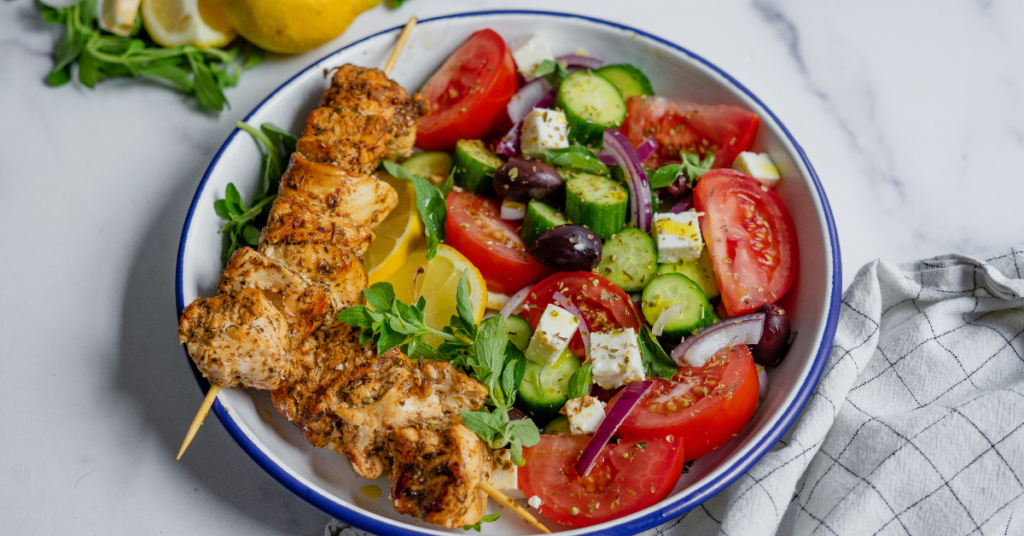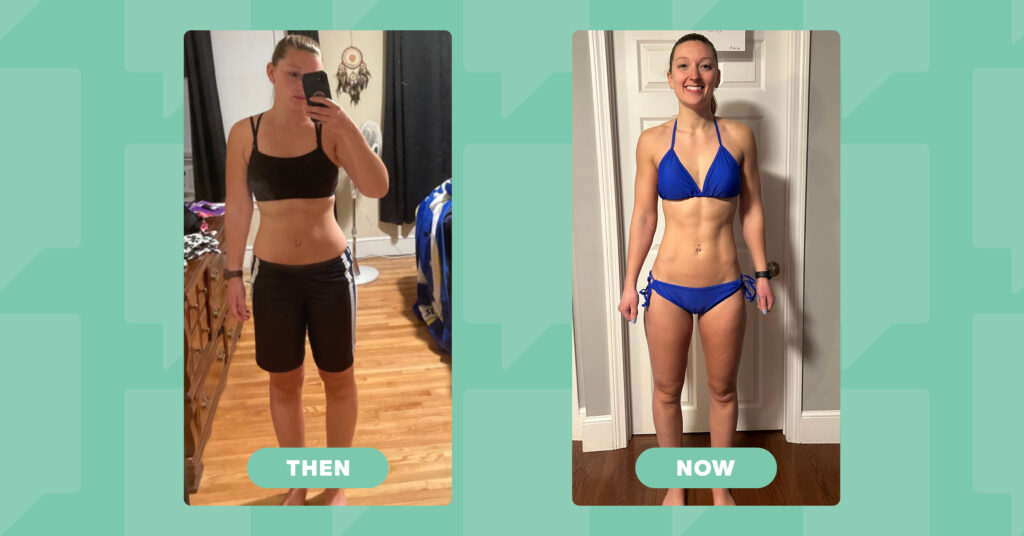At Stronger U one of the core tenets of our program is getting you to start keeping track of the things you’re eating. We believe that people who log their food consistently over time are people who tend to be the most successful dieters. But here’s a secret about Stronger U and tracking that you may not know: the truth is we don’t believe that it works just because of the tracking.
The tracking is important, for sure. But the tracking component is really nothing more than a tool to help you develop awareness around what you’re eating + a tool to objectively help you change your eating behaviors.
We know that things tend to work for people when they start to recognize what the macros of a serving of peanut butter actually looks like – and that awareness tends to bleed over into every other aspect of eating, but also how we behave.
And at the end of the day how you behave is the thing that we care the most about. But why is that? Why do we actually care about something a bit more abstract, like behavior, over the actual practical component of our program – tracking?
Because whether you’re aware of it or not, roughly 40% of your day is spent with you running on autopilot. Mindlessly going through daily habits that you go through each and every single day. Things like how you brush your teeth, back out of the driveway, eat a meal, go to the gym, etc. It’s all habit. And this can be especially true when it comes to our behaviors around food. Because in case you weren’t aware, being on autopilot when it comes to eating isn’t always the smartest decision.
However, it’s not always the easiest thing to just decide to flip the switch and become mindful of everything that you’re doing. Most of us have spent years ingraining various habits and behaviors of all kinds, especially when it comes to food. This means there are typically decades of patterns wrapped up in how someone does something as simple as sitting down to have a meal.
And that’s the thing with behavior. Once it’s set, changing it is a Sisyphean effort.
Say you decide to go against the grain and change your behavior. What do you do?
Complete lifestyle change goes far beyond the scope of this article. There are entire degree programs built around large-scale behavior change. However, we do know that the very act of learning to track and account for the things you eat on a daily basis certainly helps people to start changing their behavior simply because they become more aware of how they were behaving previously.
And while knowing that tracking alone can help you change things, that’s certainly not the only way to start playing tricks on yourself and changing your behavior. Here are 5 more strategies you can use to change your behavior on a daily basis.
Use smaller plates.
It’s been consistently shown that when you have a larger plate, you’ll eat more food. Part of this is because with a larger plate you can fit more food. Duh.
The more subtle part is that when you eat with larger plates, you don’t consider yourself satisfied as quickly as you would with a smaller plate.
Satiation is surprisingly malleable. It can be influenced by something as simple as us thinking a shake is a certain amount of calories. Using smaller plates can help influence that satiation, causing you to eat less overall.
Just so we’re clear, this isn’t some mumbo-jumbo that I’ve made up so I had something to talk about today. This is an actual phenomenon that’s been studied, with one group of researchers finding that decreasing a plate size from 12 inches in diameter to 10 inches in diameter led to subjects eating 22% fewer calories at each meal with no subsequent impact on fullness or satiation.
Put more simply: Eating on a smaller plate tricked the subjects in the study into thinking they were just as full by eating less. That’s the kind of impact that I’m pretty sure even the magical community inside Hogwarts hadn’t figured out yet, and all you’ve got to do to get it is buy new plates.
Wake up in the mornings.
We’ve all been there. Rolling over and hitting the snooze button while briefly thinking about throwing your alarm into the wall for so rudely waking you up. But here’s the deal: that snooze button just might be making your life more difficult than you know.
Constantly hitting the snooze button in the morning can actually make you feel worse throughout the day thanks to extending what is known as sleep inertia.
Sleep inertia is that feeling of grogginess that you have when you first wake up. You know, that bleary-eyed don’t-talk-to-me-until-I’ve-had-my-coffee kind of feeling. But it turns out that constantly hitting the snooze button can actually make that sleep inertia worse, leaving you to feel groggier for longer throughout the day.
Not only that, constantly pressing snooze can also impact your ability to concentrate deeply on something later in the day, impacting your productivity, willpower, and memory.
But where things especially apply for us is that we know when someone is more tired throughout the day they’re more likely to give into cravings and go off plan. Why? Because adequate sleep is a vital resource for giving us the mental strength to stay on plan and resist cravings or meals that we know may not fit into our plan at that specific moment in time.
Saying no to things requires a significant amount of energy. More than most of us are really aware of. You’ll have a much easier time of saying no and feeling okay about it when you’re well rested vs. when you’re constantly pressing snooze.
Dress like you’re already fit.
Ever heard of enclothed cognition? I doubt it. But it’s a powerful tool and one that you need to start using for your own personal gain.
Enclothed cognition basically means taking on the mindset of the clothes you’re wearing. For example, it’s been shown that if you wear a white coat that you believe belongs to a doctor, you’ll pay attention more. If you believe that the same coat applies to a painter, you won’t change at all.
In the same vein, if you don a fake police uniform just to wear around for the day, research says that you’ll start acting a bit more courageously while wearing the uniform.
Vonnegut is famous for the quote, “We are what we pretend to be, so we must be careful about what we pretend to be.” And that couldn’t be truer when it comes to the clothes we wear and how we carry ourselves on a day-to-day basis.
If you’ve got a major goal that involves some dramatic physique change, one of the most valuable things you can start doing is acting and dressing like the person who has reached that goal would. It sounds crazy, but your brain begins registering those clothes and those actions as that person, in turn creating a feedback loop. Because the more you believe you are that person, the more you act like that person, meaning the more you start to become that person.
Utilize a journal.
We are notorious for rewriting our own history for how we’d like it to go, and most of the time this is going on without us even knowing it. All day long you’re writing the story of how your day has gone, how your week has gone, what you’re working on, etc. It’s all fitting into the narrative of your life.
However, there’s a downside to this: much of what you remember is probably being remembered through rose-colored glasses. This means much of it is probably wrong to some degree or another.
That’s not a shot at you individually, that’s just a fact of life with people in general. Our brains aren’t very good at remembering hard facts about a given situation. Instead, we wrap everything up into the story that we’re telling ourselves about a fact, a situation, or a diet.
Don’t believe me? Well, it might be a bit unsettling to know that incorporating DNA evidence into the courtroom has saved thousands of people from wrongful convictions and even gotten many wrongfully convicted people released. Roughly 70% of those were wrongfully convicted on eyewitness testimony.
Are all eyewitnesses knowingly lying on the stand? I’m sure some are. It’d be naive to think otherwise. But for eyewitness misidentification to be the root cause of people getting wrongfully sent to prison roughly 70% of the time is a jarring stat, and I think we can all safely agree that the majority of those eyewitnesses probably did think that they were actually right.
Using a journal provides an extra layer of accountability to keep you from writing a revisionist’s history of your day, week, month, or year. In fact, this is part of the reason for keeping track of your food in MyFitnessPal on a consistent basis works and why we want you to fill out your spreadsheet.
Everyone has different ideas of what a “good day” or “bad day” of eating was like. Those terms are deeply ambiguous, but numbers aren’t. And when we can look back into the past and get a much clearer idea of what things have happened, we can make much more sense of what is happening right now.
Cut off most media consumption.
Bet you didn’t see this one coming did you? Before everyone loses it, I’m not saying cut out media consumption because we’re all being brainwashed by the nanny state or some other nonsense that people argue about on Facebook these days.
The truth is when it comes to shaping our behavior; the media has far more influence than we care to admit. On average, we see about 105,000 words each and every single day. Or for the more tech-inclined, we’re exposed to about 34 gigabytes of information every day.
I don’t care how strong you are, at some point, the exposure to that much information begins impacting your thoughts and behaviors. Most often without you being aware of it.
This can be seen in cases where Doctors misdiagnose AIDS because of intense, 24-hour media coverage. Or in a less depressing way, people wanting to try the latest diet that they heard about on TV.
The truth is, there exists something known as the availability heuristic. We put more emphasis on things that are immediately available to our brains. Media exposure makes certain things more available and distorts our perception of what is important.
Removing media consumption allows you to begin focusing more on your own behavior, without being swayed by what the media says is the latest diet craze, workout fad, or groundbreaking cancer-causing food.
I love that I’m a creature of habit. That’s just me, and it will always be me. It will always be you as well. We’re all creatures of habit, and behavior. That doesn’t mean we can’t try to change those, though.









